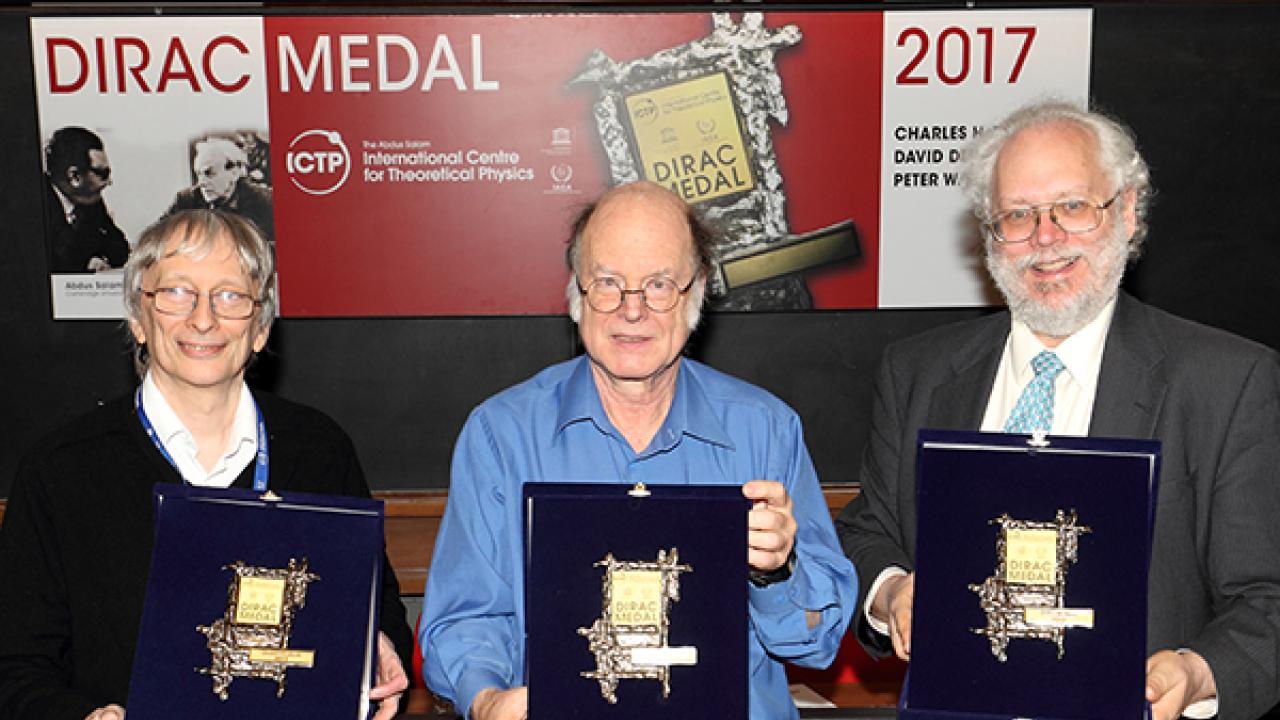
ICTP's Dirac Medal is given in honour of Paul Adrian Maurice Dirac, a distinguished theoretical physicist, a Nobel Prize winner, and a staunch friend of ICTP. ICTP's founder Abdus Salam worked with Dirac at Cambridge University and long admired the professor and his work, which included conceiving the relativistic wave equation predicting the existence of spin and of the positron. The Dirac Medal recognizes scientists who have made significant contributions to theoretical physics.
ICTP honoured three such scientists on 14 March at the 2017 Dirac Medal Award Ceremony, namely Charles Bennett of the IBM Watson Research Center, David Deutsch of Oxford University, and Peter Shor of Massachusetts Institute of Technology. The three were recognized for their groundbreaking work in applying fundamental concepts of quantum mechanics to solving basic problems in computation and communication, bringing together the fields of quantum mechanics, computer science, and information theory.
The Ceremony began with general talks by Peter Zoller, a professor at the University of Innsbruck working in quantum optics, and Artur Ekert, a professor of quantum physics and cryptography at Oxford University, and was followed by the award ceremony with talks by the three prize winners. This year's Dirac Medal Award Ceremony took part at the opening of the Spring School on Superstring Theory and Related Topics. In addition, a public event was held in downtown Trieste on quantum technologies, the common thread among this year's Dirac Medal winners.
Charles Bennett is an intellectual leader in quantum information science. Four decades ago, he independently invented and carefully analyzed what is now known as reversible classical computation, proving that classical computation can in principle be performed without consumption of energy. In some respects, reversible classical computation is a forerunner of quantum computation, which necessarily involves reversibility and must minimize stray dissipation. With Gilles Brassard (University of Montreal), Bennett invented quantum cryptography, where two distant parties share a secret encryption key, with security from eavesdroppers guaranteed by the basic quantum limitations on measurements of incompatible observables. Bennett and collaborators also introduced quantum teleportation, whereby entanglement and classical signals are used to transfer quantum states. He and coworkers proved that a quantity called the von Neumann entropy is the proper measure of entanglement for pure systems, an early result in the quantification of entanglement, which continues to be an active area of research.
David Deutsch is one of the founding fathers of quantum computing. He introduced the notion of a quantum Turing machine that would operate on arbitrary superpositions of states (that is, on qubits), the concept of the quantum logic gate and quantum circuit, as well as the network model of quantum computations. He showed that all possible operations on a quantum computer could be generated by combining sequences of a single kind of three-qubit logic gate. (Later, Bennett, Shor and coworkers showed that sequences of one-qubit gates and one simple type of reversible classical two-bit gates sufficed.) Working alone and with Richard Jozsa (University of Cambridge), Deutsch proposed the first quantum algorithms, known as the Deutsch and the Deutsch-Jozsa algorithms, showing that quantum computation could solve certain problems faster than any known classical computer algorithm.
Peter Shor boosted the field of quantum computation by designing efficient quantum algorithms for factoring large numbers and computing discrete logarithms, each of which can be used to break classical encryption schemes. He thus proved that a quantum computer could solve a useful, hard computational problem exponentially faster than any known classical computer algorithm. Shor also introduced quantum error-correcting codes and fault-tolerant quantum computation, which are schemes for coping with the effects of stray interactions (noise) disturbing qubits. Without robust quantum error correction, large-scale quantum computation could be stymied by the extreme sensitivity of quantum states to noise. Instead, the theory of quantum error correction is now a well-established branch of quantum information science, and the difficult path to developing large-scale quantum computers appears open.
ICTP's Dirac Medal is awarded annually on Dirac's birthday, 8 August, to scientists who have made significant contributions to theoretical physics. For more details about the prize and a list of past winners, visit the Dirac Medal web page.
















